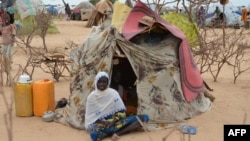The U.N. refugee agency reports tens of thousands of newly displaced people in Niger are in desperate need of international assistance. The UNHCR says about 100,000 people have fled in recent weeks from attacks launched by Nigerian Boko Haram insurgents.
The UNHCR says aid agencies are struggling to help the newly displaced who are living in makeshift shelters along the volatile Niger, Nigeria border.
Adrian Edwards, a spokesman for the UNHCR, tells VOA the people are a mix of internally displaced from Niger, some of whom have been forced to flee several times, and Nigerian refugees. He says they are scattered along one of the most difficult and remote areas in that part of West Africa.
“People are spread out over a wide area," said Edwards. "This is contributing to the difficulties in reaching them. There are no camps as such there. It is, as I said, a spontaneous settlement environment. Security is certainly a problem and this is something we are talking to the authorities about ... So far, the military authorities have not been able to provide protection across this wide area. That is something that has to be looked at.”
Edwards describes the situation as very serious. He says there are acute shortages of adequate shelter and non-food items for the displaced. He adds there also is an acute shortage of money. He notes the UNHCR has received less than half of the $51 million it needs to run its Niger operation.
“UNHCR is redirecting available resources to try and meet the needs that we are seeing there," said Edwards. "We are calling on donors for extra help to support the vulnerable population. Local officials expect more people to flee the volatile border area when the dry season returns, which I understand is at the end of February typically and when Nigerian military operations resume in the area.”
Edwards says newly arrived families have few sanitation facilities and have to walk long distances to fetch water. He says the medical charity Doctors Without Borders is providing health care and sanitation, but it too is strapped for funds.
He says many children are unable to attend school. For now, he notes, the World Food Program has enough supplies on hand to meet food demands.




